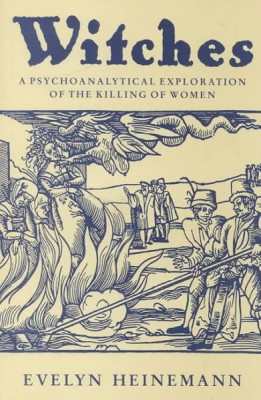| Witches: A Psychoanalytic Exploration of the Killing of Women Contributor(s): Heinemann, Evelyn (Author) |
|
 |
ISBN: 1853434787 ISBN-13: 9781853434785 Publisher: Free Association Books OUR PRICE: $32.45 Product Type: Paperback - Other Formats Published: March 2000 * Not available - Not in print at this time *Annotation: In this topical study the author argues that the naming and persecution of women as witches in the 16th and 17th century resulted from the powerful unresolved psychic conflicts of their persecutors. The historical and social contexts in which trials took place are examined for evidence of how attitudes and beliefs of the time came to play their part in the extraordinary development of this persecutory phenomenon. Ms. Heinemann asserts that the witch phenomenon is an example of the potential for destructiveness by the human imagination and shows the necessity of understanding unconscious processes in social phenomena today. The dark forces and process identifiable in the past continue to find expression in the demonization and persecution of men and women today. This book will be of interest to psychoanalysts, sociologists, social historians and women everywhere. |
| Additional Information |
| BISAC Categories: - Psychology | Movements - Psychoanalysis - History | United States - State & Local - General - Body, Mind & Spirit | Magick Studies |
| Dewey: 133.430 |
| LCCN: 00710294 |
| Physical Information: 0.6" H x 5.9" W x 8.9" (0.70 lbs) 163 pages |
| Themes: - Chronological Period - 17th Century - Geographic Orientation - Massachusetts |
| Descriptions, Reviews, Etc. |
| Publisher Description: In this topical study the author argues that the naming and persecution of women as witches in the 16th and 17th centuries resulted from the powerful unresolved psychic conflicts of their persecutors. The accusation of witchcraft and the merciless and sadistic killing of innocent women which ensued emanated from an attempt to resolve this conflict through splitting and projective identification. The historical and social contexts in which trials took place are examined for evidence of how attitudes and beliefs of the time came to play their part in the extraordinary development of this persecutory phenomenon. Claiming that Freud and others were seriously mistaken in their understanding of these events, Evelyn Heinemann asserts that the witch phenomenon is an example of the potential for destructiveness by the human imagination and shows the necessity of understanding unconscious processes in social phenomena today. It becomes clear from this analysis that the dark forces and processes identifiable in the past continue to find expression in the demonisation and persecution of men and women today. |